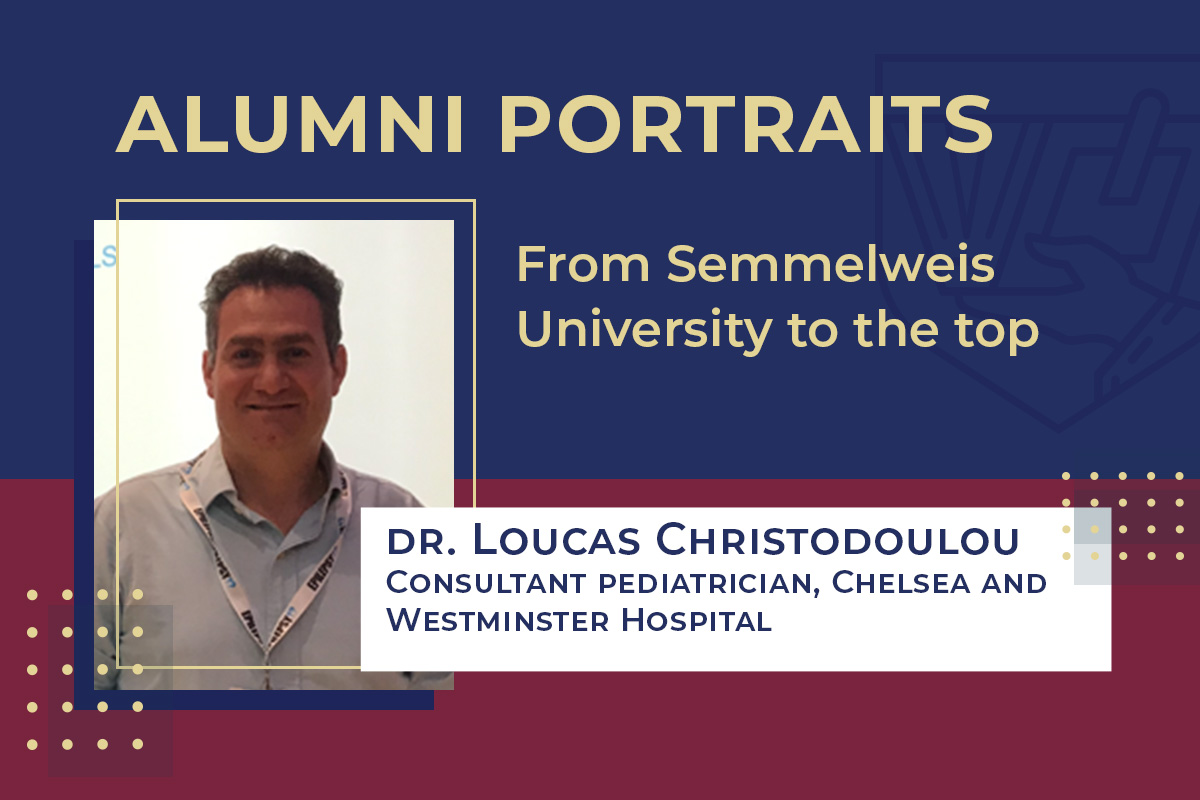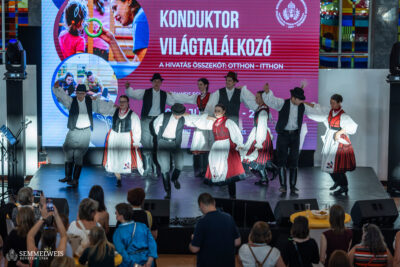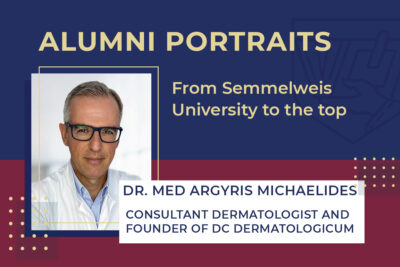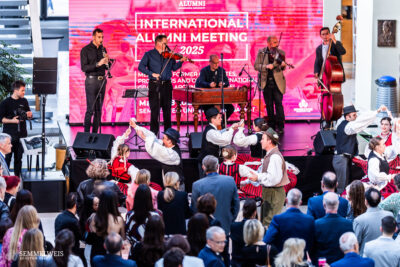How did you decide to study at Semmelweis University, and ultimately choose the medical field for yourself?
Since I was a little kid, I knew I wanted to be a doctor. After all, I was named after Saint Luke, who himself was a doctor. Moreover, I was always fascinated by the workings of the human body. At the end of my high school years, I started enquiring about cost-optimal possibilities and that’s when I heard about an academic scholarship to Semmelweis, which had a reputation as one of the best medical schools in Central and Eastern Europe. I was fascinated by the university’s past, as well as Hungary’s history and culture. I also had the opportunity to meet Professor Dr. Anna Kádár when she visited Cyprus, who convinced me that this was the place for me. So, when I was offered a full scholarship to study at Semmelweis, it was a ‘no brainer’.
What is something that differentiates Semmelweis from other medical universities in your opinion?
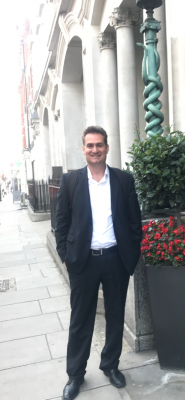
Although some might say I am biased, no one can deny that Semmelweis provides quality education and experience. It is inclusive and progressive in a very special way, and not only provided me with medical education but also with life lessons! As my anatomy professor Dr. György Nagy used to tell me, “I will teach you something for the exams (you can forget it the next day if you want), but I will also teach you something for life, and I guarantee you will remember it forever.” This ethos, culture, strong sense of community, as well as the combination of practice and academia provided me with those solid clinical foundations which helped me excel in my career.
I was once interviewed by Euronews as the president of the English Program Student’s Union (EPSUS) at Semmelweis. Reflecting on the question what I’d say to anyone challenging the quality of Semmelweis, I replied “I would rather let my actions and achievements speak for me.” Throughout my career, I worked in some of the best hospitals in the world, such as the prestigious Imperial College Healthcare NHS Trust, Great Ormond Street Hospital, UCLH, Royal London, Chelsea and Westminster, St Mary’s and King’s College Hospitals. I won national healthcare transformation and other awards, and I am currently completing a master’s in education at Imperial College London, whose medical students I also teach. I can tell you that Semmelweis University has very high standards and quality indeed.
Could you elaborate on how your career unfolded after university?
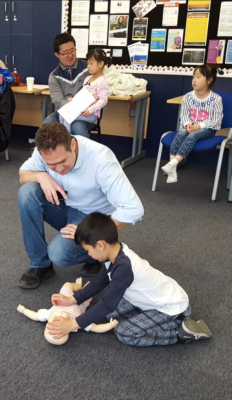
In the clinical years of university, I completed clinical attachments both in the UK and Cyprus. I was thus lucky to have experienced three different medical systems before graduating Valedictorian with summa cum laude. Soon after, I got offered a job in London as a senior house officer at UCLH emergency department and was also the first contracted doctor in the first private emergency department in the UK, at Princess Grace Hospital.
I was awarded membership to the Royal College of Pediatrics and Child Health in 2009 and completed my higher specialist training in July 2015. I developed an interest in pediatric neurology and currently I am practicing as a consultant pediatrician with a neurology interest at Chelsea and Westminster NHS Trust. I am also a fellow of the Higher Education Academy and a senior clinical lecturer at Imperial College London. I have been actively involved in various projects to improve quality of care and involvement, some of which led to National Healthcare Transformation Awards.
What journey led you to have a career in child health?
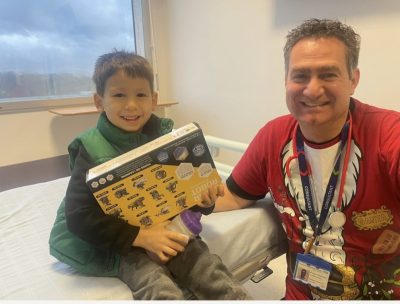
I was always surrounded by children, ever since I could remember. I was one of six children, but my mother was also looking after other kids at our house. This made me really good at interacting with children, establishing rapport, and developing a kind of emotional intelligence which is invaluable for any pediatrician. Furthermore, I was a bit wild, so I had quite a few medical encounters myself! I remember vividly when I broke my arm at the age of nine and needed a surgery. When I woke up in the middle of the night in an adult ward, with no one near me and in a lot of pain, I went to the nurses’ room. They told me off for leaving my bed, gave me two paracetamol tablets and told me to go back. As the only thing I had until then was chewable aspirin, I put the tablets in my mouth and started chewing. You can imagine the taste! I spat them out and went back to bed where I cried all night, scared and in pain. That was the moment I definitely decided to try and become the best pediatrician, so that I could make other children’s experiences better. I am currently the head of pediatric neurology at my hospital, running epilepsy and headache clinics and I have contributed to an innovative book on migraines in children and an online training course for parents.
What is the highlight of your job, that makes you happy at the end of the day?
Working with children is always a very rewarding and fulfilling job, making me happy and keeping me young! Returning home, though, to my own children and seeing them healthy and happy, is by far the biggest highlight! One should never take health and family for granted.
Could you talk about unexpected projects or events you were part of? What would your younger self be surprised you encountered during your career?
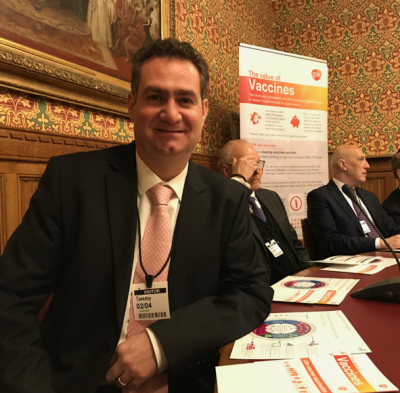
I have always valued proactivity. As a result, I was invited to the House of Lords three times, as part of my work on vaccination awareness and promotion. I am also a member of a European Steering Committee of Neuropediatric experts, looking at the Dravet Syndrome diagnostic pathway and seeking improvement towards earlier diagnosis and treatment internationally.
There were also some shocking events I encountered. I was one of the first attending doctors in the hospital nearest the Grenfell Tower fire in London and at a major trauma center during the London terror attacks. These are events that unfortunately are difficult to shake from memory and I constantly pray for those who suffered and for humanity to prevail.
In what aspects of your life or work do you think you benefited from studying at Semmelweis?
First of all, I cherish the friendships and the sense of belonging to a wonderful community. It also gave me strong foundations for my career and importantly, resilience to deal with the adversities of life and work.
Furthermore, I learned a new language, I enriched my personality and developed a sense of pride but also humility to have met and have been taught by truly great people such as Professor Dr. Béla Halász, who discovered the famous ‘Halász knife’ for denervation of brain pathways of the pituitary hormones and more. I remember him saying, “if the brain was simple enough for us to understand it, we would be too simple to understand it.” He and Dr. György Nagy were my inspirations to study the brain and its workings even more, hence my interest in neurology.
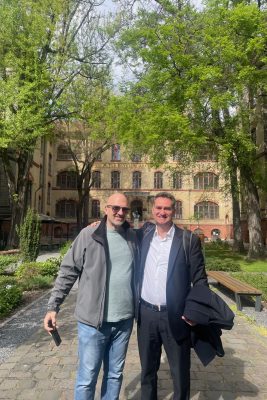
How would you describe what being an alumni member means to you?
Being an alumni member is both a ‘lifeline of belonging to the Semmelweis community’ and an opportunity to offer back to my alma mater. It helps bring fond memories back, reunite with friends and maintain a sense of pride for our school. It is also an important route for networking with colleagues internationally.
What hobbies did you have during your studies and working years, and what positive effects did it have on you?
I remember the material was so much and so hard in the beginning that I thought I would never have any time for hobbies! However, being involved in sports and having a weekly football match with friends was a welcomed distraction from studying and a good way to maintain my wellbeing. Travelling around and exploring Hungary, enjoying the Danube view was also a great highlight and a source of great friendships.
How did you manage to create a balance between your professional and personal life?
It was challenging in the first two years, with the strict emphasis on the basic sciences, trying to learn the language and find a place to stay. However, good friends helped with that. Sometimes they had to drag me from my desk and take me out to have some fun. Going to the Greek Orthodox church every Sunday morning was also a social and cultural event. And I was extremely lucky to have a lovely, helpful Hungarian landlady, who happened to cook the best töltött káposzta (staffed cabbage) ever!
Going back, what advice would you give to your undergraduate self?
Go a year early for pre-med. Immerse yourself fully in the culture, make more Hungarian friends and try really hard to keep in touch with them and be kind to everyone. But I would still say:
Study hard and embrace the hardships. This is what made me who I am now.
Hanna Szekeres, Alumni Directorate
Photo: Loucas Christodoulou
